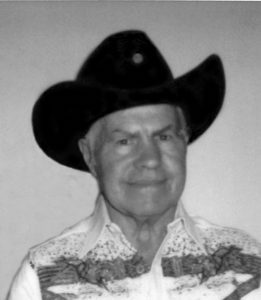Weldon Bascom
Frank Weldon Bascom, a brother of world-renowned cowboy Earl Bascom, was a champion rodeo cowboy, stock contractor, trick rider, rodeo announcer, and movie actor, stuntman, and producer. He was born on January 3, 1912, in Naples, Utah. His father, John W. Bascom, had been a deputy sheriff in Utah who chased Butch Cassidy and the Wild Bunch Gang. He was also an old cowhand.
The family owned a ranch in Welling, Alberta, Canada. In 1916, at their ranch, Weldon and his brothers, Earl, Raymond, and Melvin, designed and built history's first side-delivery rodeo chute. He and his brothers, as well as their father, have all been inducted into halls of fame for their rodeo achievements. Weldon rode bulls, saddle broncs, and bareback broncs. He and Earl were champion bull riders and at one time were listed among the top three in the world. His rodeo nickname was “the Preacher.”
While working on the Hickman Ranch near Columbia, Mississippi, Weldon and Earl produced the world’s first night rodeo held outdoors under electric lights (1935). While there, Weldon met and married Rose Flynt. She learned trick roping from Earl and became a skilled trick rider under the name of Texas Rose Bascom.
In 1936 Weldon competed in the Texas Frontier Centennial Rodeo in Fort Worth and then got a job riding bucking horses for a touring Wild West Show. In 1939, Weldon and Rose moved to Wyoming where he worked in a coal mine. The next few years found them in Southern California where they both became Hollywood actors and then back to Utah where he worked in mines in Myton and Vernal. After World War II, they moved back to Hollywood just as the Golden Age of the Hollywood Cowboy had begun. He is known for his work on The Lawless Rider (1954, in which Rose starred—he was an associate producer and had a small part as the sheriff), and Rhythm on the Range (1936, where he doubled for Bing Crosby riding a bucking horse). Weldon and Earl also worked on a ranch in Perris, California, which had been owned at one time by Louis B. Mayer of MGM Studios.
Weldon and Rose worked at one time for the Eddie Lee Homes for Youth. He also attended Brigham Young University.
After retirement, Weldon and Rose moved back to Utah and lived in cities in Southern Utah, including Bloomington, Enoch, Parowan, and St. George. They were the parents of four daughters and one son. Weldon passed away on July 9, 1993, in St. George.
In 2016 the Pro Rodeo Hall of Fame honored both Weldon and Earl with the “Rodeo Pioneer Award” and declared them both to be the “Fathers of Rodeo Brahma Bull Riding” as they introduced and promoted brahma bull riding as a rodeo event while in Mississippi.
- Given in recognition of his complete dedication to the sport of professional rodeo spanning several decades; for his contributions as a rodeo newspaper reporter and published author, for his innovation and foresight as the “Father of Brahma Bull Riding”; and for his contributions as a rodeo athlete and champion, producer, stock contractor, trick rider, announcer, and western movie actor and stuntman; and for continuing the family legacy of true professional rodeo pioneers, Weldon Bascom is awarded the Ken Stemler Pioneer Award.[1]
The Mississippi Rodeo Hall of Fame called Weldon and Earl the “Fathers of Mississippi Rodeo.” He was inducted into the Mississippi Rodeo Hall of Fame on March 12, 2021.
He was a member of The Church of Jesus Christ of Latter-day Saints. Bascom was called to serve two proselyting missions for the Church, one after the other, and both were in the Southern States Mission serving under President LeGrand Richards. His first mission was from 1932 to 1934. After his release, he went home to Canada and joined his three older brothers who were preparing to go to London, England, to be contestants in the World Championship Rodeo held in the White City Stadium. They were waiting for passports, but Weldon already had one. So when the needed passports never came in time for his older brothers, Weldon was the only one of the Bascom boys able to go. As an interesting side note, at the London rodeo Weldon rode the most famous bucking horse in the world—Midnight—but he was bucked off. Not long after Weldon’s return from Europe, he was called on his second mission, a short-term one, leaving in December of 1934 and returning home in the summer of 1935. Weldon and his brother Earl, with Jake Lybbert and Waldo Ross, then traveled back to Mississippi where they put on the first rodeos in the Deep South.
